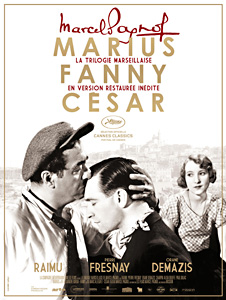MARIUS
International Premiere (restored version) • Drama • France 1931
DCP • 1.20 • Mono • Black & White • 130 min
Directed by: Alexander Korda
Written by: Marcel Pagnol
Cinematography: Theodore J. Pahle
Film Editing: Roger Spiri-Mercanton
Original Score: Francis Gromon
Produced by: Marcel Pagnol (Les Films Marcel Pagnol), Paramount France
Cast: Raimu (César Olivier), Pierre Fresnay (Marius), Orane Demazis (Fanny), Fernand Charpin (Honoré Panisse), Alida Rouffe (Honorine Cabanis), Paul Dullac (Félix Escartefigue), Alexandre Mihalesco (Piquoiseau)
International Sales: CMF-MPC
COLCOA is pleased to celebrate a cornerstone of early French cinema with a special screening of this Alexander Korda masterpiece, restored to its original glory by the Cinematheque Francaise and the Franco-American Cultural Fund. Marcel Pagnol’s original play was a monstrous stage hit. With the arrival of sound cinema, Pagnol seized the opportunity to adapt it to film. Marius, the first installment of what would come to be known as the Marseille Trilogy, is set in the colorful Old Port of Marseille, where ordinary but lovable characters are coping with everyday problems. There’s Marius, a humble barkeep who is torn between his wanderlust for exotic ports of call and his unspoken love for Fanny, the fishmonger’s beautiful daughter, who harbors a secret love of her own. There’s Marius’ father César, whose generosity of spirit is overruled by his tendency to interfere. Then there’s Panisse, the aging widower with no heir, whose intention to wed Fanny and make a son to take over his sail manufacturing business sends ripples up and down the port.
Director Alexander Korda was a Hungarian refugee who eventually made his career in London after stints in Hollywood and Paris. His The Private Life of Henry VIII (1933) received a best picture nomination and won a Best Actor Oscar for Charles Laughton. The first British film producer to be knighted, Korda gave early support to such talents as Michael Powell, Emeric Pressburger, Laurence Olivier, David Lean, and Carol Reed.
Writer/producer Marcel Pagnol’s creative signature is fully recognized in Marius, in which he unapologetically pushed dialogue to the front and center of his narrative style. An early champion of sound, Pagnol stood firm against the likes of men like René Clair. His love of simple characters, and provincial life in southern France foreshadowed neo-realism. Although the Marseille Trilogy began as theater, the final installment, César (1936), was written directly as a screenplay for Pagnol to direct. Its popularity gave Pagnol the means to establish his own film production company. Ever the renaissance man, Pagnol had successful parallel careers as journalist, publisher, and author, notably of Jean de Florette and Manon of the Spring, which he also adapted to film in 1953.
QUOTES:
“[Marius] helped to position the auteur at the heart of French cinema. Its impact can be felt today, in the unusually high proportion of naturalistic dramas that come out of France each year, many of which tackle the very same issues.”
– James Travers, Films De France
“…special credit goes to Raimu, an extraordinary artist who almost literally exposes his very soul up on the screen.”
– Jeffrey M. Anderson, Combustible Celluloid






